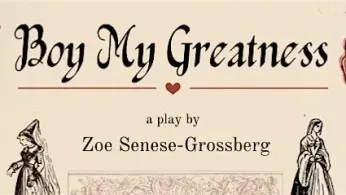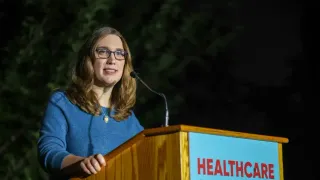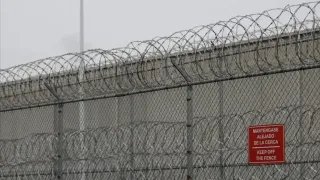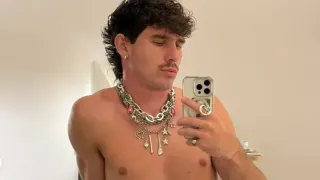
Sep 18
Oklahoma Students Revive Shakespeare-Inspired Play After University Cancels Production Over Anti-Trans Law Fears
READ TIME: 4 MIN.
In early September 2025, theatre students at the University of Central Oklahoma were preparing to stage "Boy My Greatness", a play by Zoe Senese-Grossberg that explores the lives of the young boys who performed female roles in Shakespeare’s Globe Theatre during the 1600s. The play is notable for its historical accuracy and its nuanced reflection on gender, inviting a cast across the gender spectrum—cisgender men, cisgender women, and nonbinary students—to embody Shakespeare’s tradition in a modern, inclusive way .
Liberty Welch and Maggie Lawson, the student co-directors, felt a deep connection to the material. Welch, who identifies as queer, said, “As a queer person, I have those feelings also, and it's hard for me to imagine not having the words to place my feelings. And so, for a play to be able to do that without having any labels whatsoever is so interesting” .
Three weeks before opening night, Welch was informed that the university had cancelled the production. The head of the theatre department cited Oklahoma State Bill 796, a law that targets equity, diversity, and inclusion in state-funded institutions, as the reason the play could not go forward . Welch recalled, "The head of our theatre department pulled me out of class Tuesday at 11 a.m. and was like, 'Hey, you can't do the play. It got up to legal or somebody, some higher power, and they said absolutely not.'" .
Students quickly deduced that the play’s gender-blind casting—allowing anyone of any gender to perform female Shakespearean roles—was considered a violation of the law, despite the absence of explicit LGBTQ+ language in the script . The administration offered two options: choose a new play with only three weeks of rehearsal or self-produce "Boy My Greatness" outside university auspices.
The university also approached playwright Zoe Senese-Grossberg with a new contract that included clauses about casting and gender, as well as provisions that would hold her liable in the event of a lawsuit. On advice from the Dramatists Guild, Senese-Grossberg declined to sign, halting any further university involvement .
Senese-Grossberg expressed her concern that such legal precedents could deter future productions of plays dealing with gender and sexuality, noting, “It feels not just a case of artistic censorship but part of a broader effort to keep trans people out of public life and to erase them from any historical narratives” .
Faced with administrative roadblocks, Welch and Lawson turned to their community for support. They launched a GoFundMe campaign, and within days, raised nearly $10,000 to stage the production independently . The fundraising effort drew donations from a wide spectrum of supporters, including conservative Oklahomans who, while often hostile to LGBTQ+ rights, cited concerns about freedom of speech and artistic expression .
With the necessary funds secured, the students booked an alternative venue and began rehearsals for an October 23 premiere. The community’s response was overwhelmingly positive, with many expressing pride in the students’ determination not to be silenced .
A local theatre professional commented, “The future of the theater in America relies on the perseverance of brave truth tellers and artists like them!” . Another supporter noted the historical irony: in Shakespeare’s time, all roles—including female characters—were performed by male actors due to restrictions on women on stage, making the play’s gender-blind casting not only inclusive but also historically accurate .
Oklahoma’s anti-trans and anti-LGBTQ+ legislation has created a chilling effect on artistic and educational institutions, leading to increased censorship and self-censorship. Title IX, a federal law prohibiting sex-based discrimination in education programs, is cited by some as a protective measure, but state laws like SB 796 have introduced uncertainty and risk for those seeking to stage works that challenge or expand traditional notions of gender .
The cancellation and subsequent resurrection of "Boy My Greatness" highlight both the vulnerability and the resilience of LGBTQ+ students and allies in hostile political climates. The university’s actions have raised alarms about broader efforts to limit trans visibility and queer narratives, especially in historically conservative states .
For LGBTQ+ advocates, the incident underscores the importance of community solidarity and direct action. By circumventing institutional censorship, the students and their supporters have modeled a blueprint for resistance—one that harnesses collective strength to defend artistic freedom and LGBTQ+ representation .
The successful fundraising and upcoming independent production are seen as a triumph for LGBTQ+ visibility and freedom of expression. Community members have expressed hope that such acts of resistance will inspire other students and artists facing similar barriers .
Senese-Grossberg, the playwright, remains optimistic about the power of her work to foster dialogue and understanding. “Laws seem to be built in such a broad way that anything can be censored should the people in power want to... It really does freak me out in regards to my work, which is often dealing with gender and sexuality,” she said .
As the students prepare for opening night, their story stands as a testament to the enduring power of theatre to challenge, educate, and unite. The production of "Boy My Greatness" is not only a celebration of historical accuracy and artistic courage but also a rallying cry for LGBTQ+ rights in an era of increasing legislative hostility .






